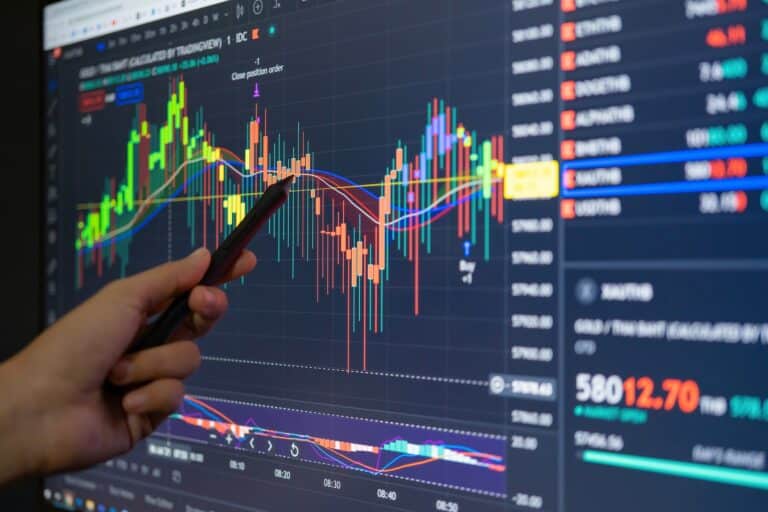Cryptocurrencies have quickly positioned them as potential risk diversifiers amid economic uncertainties. Due to their decentralized nature, operating independently of traditional financial systems, digital currencies offer an alternative asset class that reacts differently to market stress than conventional assets.
Recent geopolitical tensions and subsequent volatility in cryptocurrency markets underscore the importance of understanding the complex dynamics of these digital assets. Studies examining the cryptocurrency market’s reaction to geopolitical events can shed light on their suitability as protective financial instruments in the face of economic threats.
Cryptocurrency As An Economic Threat Diversifier
In recent years, cryptocurrencies have proven to be a potential instrument for hedging against economic policy uncertainties. As traditional financial systems have proven vulnerable during events such as the COVID-19 pandemic, individuals and institutions have considered cryptocurrencies a form of diversification. Unlike traditional assets, cryptocurrencies operate on a decentralized ledger system that can mitigate the impact of local economic disruptions.
In times of economic volatility, cryptocurrencies have shown some resilience, suggesting their potential as a diversifying asset. Thus, the unique characteristics of cryptocurrencies offer a degree of decorrelation with traditional market forces, making them a compelling option for those looking to diversify their risk. Even as traditional markets experienced profound effects of pandemic-related uncertainty, some cryptocurrencies saw a surge in adoption, highlighting their role as an alternative investment in times of crisis.
However, the use of cryptocurrencies for diversification is not without risks. The crypto market is known for its high volatility, which can be a double-edged sword. Therefore, it’s important for investors to thoroughly assess their risk tolerance and consider the proportion of cryptocurrencies in their investment strategy. The aim is not to replace traditional investments but to complement them to create a more robust portfolio that can withstand various economic challenges.
Analyzing Market Risks Of Cryptocurrencies
Cryptocurrencies have ushered in a paradigm shift in the financial markets, bringing a unique set of market risks. Investors and regulators must navigate the dynamic landscape of price volatility, legal frameworks, and security protocols to maintain market integrity and manage risk effectively.
Price Volatility And Market Dynamics
Cryptocurrencies are known for their wild price swings due to various factors, including market sentiment, investor behavior, and news events. The volatility of cryptocurrency prices affects their market capitalization and poses a significant risk to investors and financial markets. A study analyzing the financial risk management strategies recommended for cryptocurrencies suggests that their unpredictability must be carefully considered in any investment decision.
In the context of market dynamics, liquidity is also a critical aspect. The entry and exit of large amounts of capital can strongly influence prices, underlining the need for effective risk management in cryptocurrency investments.
Regulatory Challenges And Legal Aspects
The regulatory landscape for cryptocurrencies is constantly evolving as authorities and Congress grapple with integrating this new asset class into the existing legal framework. The biggest challenge lies in establishing regulations that protect investors from fraud and money laundering without hindering innovation. With regulators still trying to understand the implications of cryptocurrencies, legal uncertainty continues to pose a significant risk to participants in the digital asset space.
Applying traditional financial law to a technology-driven market raises questions regarding jurisdiction and enforceability. Inadequate regulation can lead to an environment that encourages fraudulent activity and jeopardizes the integrity of financial markets.
Security Concerns In The Digital Space
Security risks are paramount in digital transactions, with unauthorized access to private keys remaining a major concern. As the study of risks associated with cryptocurrencies has shown, protocols to ensure the integrity of transactions must be robust against cyber threats.
Preventing fraud and unauthorized transactions requires constant vigilance and the development of advanced security measures. The decentralized nature of blockchain poses a particular challenge, as security risks must be managed across a distributed network. This requires concerted efforts by all stakeholders to maintain security standards and protect market participants.
Investment Strategies With Cryptocurrencies
In the dynamic world of investing, cryptocurrencies have emerged as both a potential risk diversifier and a new frontier for portfolio innovation. Investors and portfolio managers are exploring how digital assets can improve portfolio diversification and hedge against traditional financial assets.
Portfolio Diversification With Digital Assets
Bitcoin, often seen as ‘digital gold,’ has shown the potential for high returns, while its low correlation with traditional assets can reduce overall portfolio volatility. On the other hand, Ethereum plays a central role due to its smart contract capabilities, opening up various investment opportunities.
The introduction of stablecoins — cryptocurrencies pegged to stable assets such as fiat money — gives investors exposure to the digital asset market with lower volatility.
Hedging Against Traditional Financial Assets
In times of market uncertainty or high inflation, some investors turn to cryptocurrencies as a shield against the debasement of fiat money. In the past, gold has been the first choice to hedge against such economic threats, but cryptocurrencies offer an easily transferable and divisible digital alternative.
As the crypto market matures, asset managers are considering Bitcoin and similar digital assets as part of a broader hedging strategy alongside gold and other safer assets.
Blockchain Technology And Asset Tokenization
As the digital economy matures, blockchain technology and the tokenization of assets are becoming key elements. They have the potential to transform traditional finance by making payments and other financial activities more secure, transparent, and efficient.
Advancements In Blockchain Applications
The development of blockchain technology has gone beyond its original use case of cryptocurrency and has expanded into various areas of the digital economy. Technological innovations have enabled the application of blockchain in the creation of digital currency systems that are more inclusive and accessible.
Empirical analysis of blockchain’s performance demonstrates its potential as a risk diversifier for economic threats by providing decentralized and tamper-proof ledgers. One notable advance is the creation of stablecoins such as DAI, which are pegged to stable assets to minimize price volatility, thus providing a more predictable digital currency for transactions.
Additionally, blockchain is at the forefront of tokenization, which is converting rights to an asset into a digital token on a blockchain. This represents a significant leap in technological innovation and enables fractional ownership, increased liquidity, and better access to different asset classes.
Impact Of Tokenization On Finance
The tokenization of assets represents a transformative approach to finance by improving the liquidity of traditionally illiquid assets such as real estate or art. The blockchain provides a trusted platform for these transactions, expanding the scope for investment and democratizing access to capital. By using blockchain-based tokens, smaller investors can participate in financial opportunities that were previously reserved for large investors.
In payments, tokenization could increase the efficiency of transactions by bypassing traditional banking infrastructures, reducing costs and settlement times. This shift points to an innovative and inclusive financial ecosystem. The digital economy is poised to reap the benefits of blockchain technology as asset tokenization becomes an increasingly common method of financing in both emerging and developed economies, further cementing the role of blockchain as the foundation for digital financial services.
Cryptocurrency Market Trends And Analysis
The cryptocurrency market is characterized by significant volatility and evolving patterns, influenced in particular by the rise of decentralized finance (DeFi) and the diversification of altcoins. Understanding these trends is essential to understanding the dynamic role of cryptocurrencies within the global financial system.
Emerging Patterns In Cryptocurrency Adoption
In recent years, an increasing acceptance of cryptocurrencies has been observed, influenced by factors such as the drive for more inclusive financial services and innovations in payment systems. The onset of COVID-19 accelerated the trend toward digitalization, with cryptocurrencies emerging as alternative payment and investment options.
They’re often seen as electronic cash systems that complement the traditional global financial architecture. As a result, various cryptocurrency exchanges have emerged, facilitating the exchange of various digital assets and gaining a significant market share.
Influence Of DeFi And Altcoins On Markets
DeFi has introduced a decentralized framework for providing financial services using smart contracts and DeFi tokens. These platforms offer lending, borrowing, and staking without the intermediaries typical of traditional finance. In parallel, the market is being reshaped by the proliferation of altcoins.
Altcoins represent a growing segment of digital assets competing for dominance alongside Bitcoin, contributing to a more diverse and resilient ecosystem. They drive innovation and offer use cases from utility to governance that appeal to a broader audience than traditional crypto enthusiasts.
Diversify Your Retirement Portfolio With Precious Metals
If you’re interested in combining the innovation of digital assets with the enduring stability of traditional wealth, Noble Gold Investments offers a unique opportunity to invest in gold and other precious metals in a secure, tax-deferred retirement account.
Contact us to find out more and get started today. Call us at (877) 646-5347 or click here to open your free Precious Metals IRA account.







